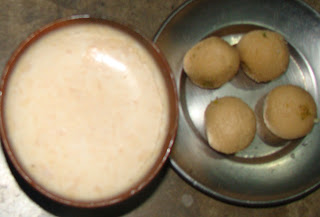Luchi and Mangsho
I can't remember when I experienced luchi after I left West Bengal.
Luchi is a deep fried flatbread made of bleached wheat or maida and much more, much more than just something delicious to eat! Luchi means a puja (worship), a birthday clebration; luchi means a Sunday breakfast! When luchi is there, we know we are going to have payesh or halua and/or alur dom or mangso or alubhaja or chholar dal! Luchi is closely associated to festivity, to happy occasions! That is why I used "experience" instead of "eat" or "have".
In Germany I never prepared luchi or roti although I cooked for my friends often but always chose something I could cook fast, even though the preparation before cooking was long sometimes. Every time I had such a party, I wished if my sister could be there! So, I decided to cook chicken curry which was popular among my friends in India and abroad and luchi for dinner because my sister loves chicken and I missed luchi.
Luchi
Murgir Mangsho: Chicken Curry
I bought sandesh and lal doi to have at the end. We, Bengalees, love sweets and our meals must end with some sweetness: madhureNa samapayet!
Lal Mishti Doi and Sandesh
Not just in our food culture, the popular luchi has its well-desereved place in our literature as well.
Who among us doesn't feel nostalgic about the popular rhyme by Mohit Ghosh: "phulko luchi phulko luchi/ pet ta phule dhak/ phulko luchi phulko luchi/ peter bhitor phank!/ "?
But not all children can enjoy luchi since their parents cannot afford it. Examples are Apu and Durga, the young protagonists of "Panther Panchali" by Bibhutibhushan Bandopadhyay, another classic of Bangla (Bengali) literature: Apu felt happy seeing luchi on his plate as he accompanied his father to his disciples' house and sad too, at the same time, since he could not share it with her sister at home. Luchi is something they seldom had.



